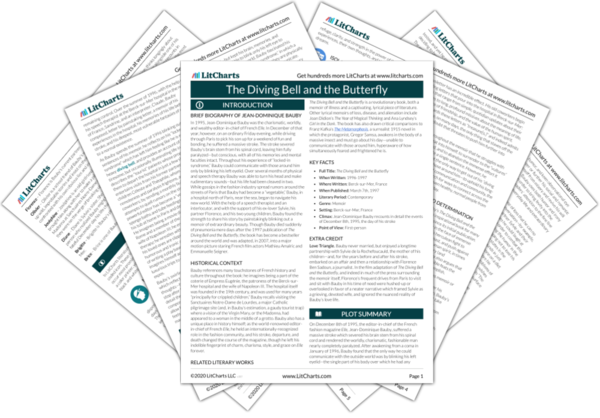Brief Biography of Jean-Dominique Bauby
In 1995, Jean-Dominique Bauby was the charismatic, worldly, and wealthy editor-in-chief of French Elle. In December of that year, however, on an ordinary Friday evening, while driving through Paris to pick his son up for a weekend of fun and bonding, he suffered a massive stroke. The stroke severed Bauby’s brain stem from his spinal cord, leaving him fully paralyzed—but conscious, with all of his memories and mental faculties intact. Throughout his experience of “locked-in syndrome,” Bauby could communicate with those around him only by blinking his left eyelid. Over several months of physical and speech therapy Bauby was able to turn his head and make rudimentary sounds—but his life had been cleaved in two. While gossips in the fashion industry spread rumors around the streets of Paris that Bauby had become a “vegetable,” Bauby, in a hospital north of Paris, near the sea, began to navigate his new world. With the help of a speech therapist and an interlocutor, and with the support of his ex-lover Sylvie, his partner Florence, and his two young children, Bauby found the strength to share his story by painstakingly blinking out a memoir of extraordinary beauty. Though Bauby died suddenly of pneumonia mere days after the 1997 publication of The Diving Bell and the Butterfly, the book has become a bestseller around the world and was adapted, in 2007, into a major motion picture staring French film actors Mathieu Amalric and Emmanuelle Seigner.
Historical Context of The Diving Bell and the Butterfly
Bauby references many touchstones of French history and culture throughout the book: he imagines being a part of the coterie of Empress Eugénie, the patroness of the Berck-sur-Mer hospital and the wife of Napoleon III. The hospital itself was founded in the 19th century, and was used for many years “principally for crippled children.” Bauby recalls visiting the Sanctuaires Notre-Dame de Lourdes, a major Catholic pilgrimage site (and, in Bauby’s estimation, a gaudy tourist trap) where a vision of the Virgin Mary, or the Madonna, had appeared to a woman in the middle of a grotto. Bauby also has a unique place in history himself; as the world-renowned editor-in-chief of French Elle, he held an internationally-recognized role in the fashion community, and his stroke, departure, and death changed the course of the magazine, though he left his indelible fingerprint of charm, charisma, style, and grace on Elle forever.
Other Books Related to The Diving Bell and the Butterfly
The Diving Bell and the Butterfly is a revolutionary book, both a memoir of illness and a captivating, lyrical piece of literature. Other lyrical memoirs of loss, disease, and alienation include Joan Didion’s
The Year of Magical Thinking and Ana Lyndsey’s
Girl in the Dark. The book has also drawn critical comparisons to Franz Kafka’s
The Metamorphosis, a surrealist 1915 novel in which the protagonist, Gregor Samsa, awakens in the body of a massive insect and must go about his day—unable to communicate with those around him, hyperaware of how simultaneously feared and frightened he is.
Key Facts about The Diving Bell and the Butterfly
-
Full Title: The Diving Bell and the Butterfly
-
When Written: 1996-1997
-
Where Written: Berck-sur-Mer, France
-
When Published: March 7th, 1997
-
Literary Period: Contemporary
-
Genre: Memoir
-
Setting: Berck-sur-Mer, France
-
Climax: Jean-Dominique Bauby recounts in detail the events of December 8th, 1995, the day of his stroke
-
Point of View: First-person
Extra Credit for The Diving Bell and the Butterfly








